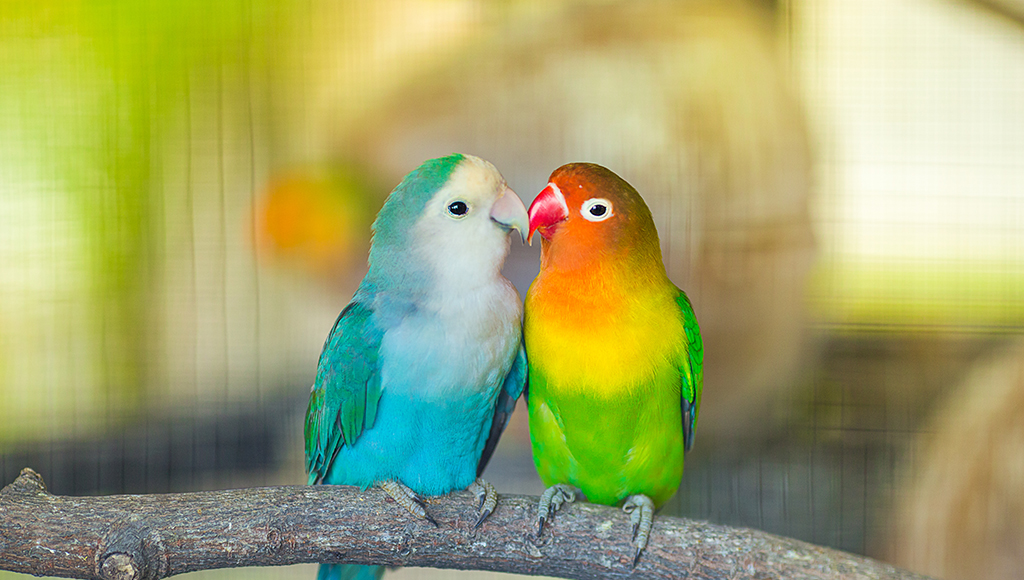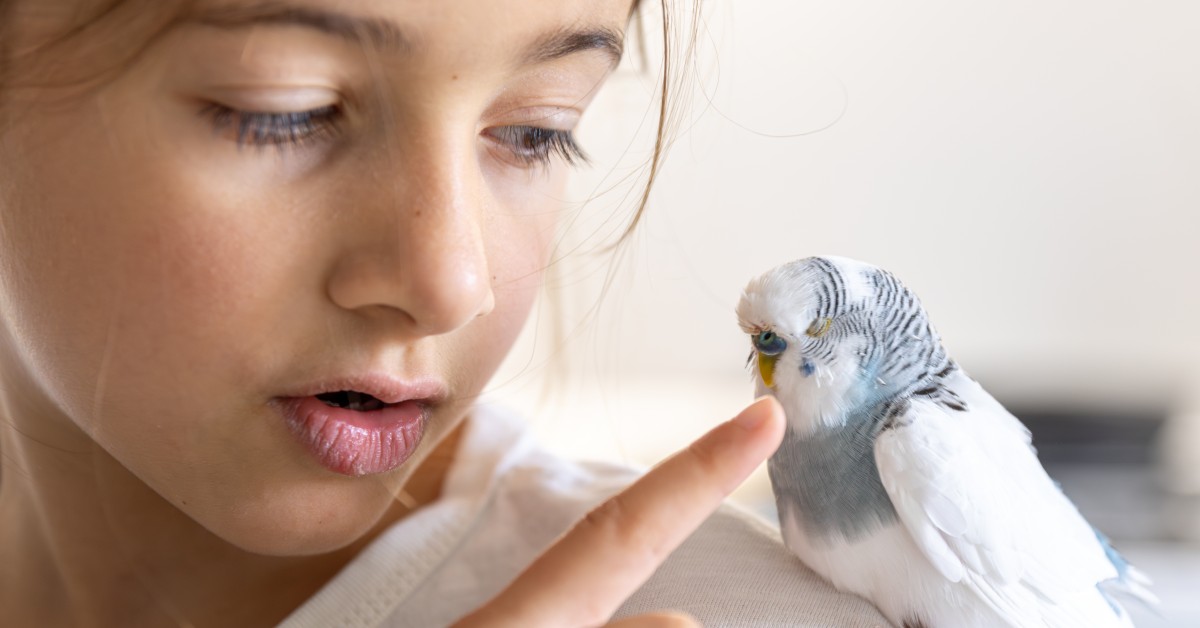Loveable Lovebirds!
These birds are curious, energetic, charming and highly trainable.

Lovebirds are often considered the most beautiful of the small parrot family. There are several different varieties. Peachface, the most popular variety comes in colors like Dutch-Blue, Cinnamon, Lutino and Pied. The African Lovebird, originating from Africa comes in nine different varieties, and is absolutely gorgeous. Lovebirds are curious, energetic and charming. They are also very intelligent and highly trainable creatures. Is a lovebird the right companion animal for you? Here is some basic information that might be helpful.
Appearance:
- Average Size 4 to 7 inches long
- Come in a variety of colors
Diet:
- Specialized pelleted diets are highly recommended and should consist of 60 - 70% of the diet
- Use fortified seeds in moderation as they are higher in fat and less nutritious than pellets
- Fresh fruits and vegetables, such as bananas, carrots, and green leafy vegetables
- Clean, fresh, filtered and chlorine-free water changed daily
- Do not feed birds fruit seeds, avocados, chocolate, alcohol, or caffeine as these can cause serious medical problems
Feeding:
- If your bird is used to a seed diet, convert to pellets gradually; fresh pellets or seeds and fresh, clean, chlorine-free water should always be available
- Fresh fruits and vegetables should be given daily and discarded when not eaten within 24 hours
- Lovebirds appreciate quality and variety in their food
Housing:
- Birds acclimate well to average household temperatures; be cautious of extreme temperature change
- Cage should be placed off the floor in an area that is well-lit and away from drafts
- A cage approximately 18" W x 18" D x 24" H, with metal bars spaced no greater than 3/8" apart, makes a good home for your lovebird
- As with all animals, it is best to provide the largest habitat possible; a flight cage is strongly recommended. Perches should be at least 4" long and 1/2" in diameter
- A variety of perch sizes to exercise feet and help prevent arthritis is recommended
- A metal grate over the droppings tray will keep the bird away from droppings
- Line the droppings tray with cage paper or appropriate substrate for easier cleaning; to avoid contamination, do not place food or water containers under perches
- Bird owners should avoid non-stick cookware and appliances as they can release fumes hazardous to your birds health
Habitat Maintenance:
- Clean and disinfect the cage and perches regularly
- Replace substrate or cage liner weekly or more often if needed
- Replace perches, dishes, and toys when worn or damaged
- Rotate new toys into the habitat regularly
- Ensure that there are no cage parts or toys with lead, zinc or lead and lead-based paints or galvanized parts as these can cause serious medical issues if ingested by your bird
Grooming and Hygiene:
- Provide filtered, chlorine-free, lukewarm water regularly for bathing (remove the bathing water when done)
- As an alternative, mist the bird with water or a grooming spray
- Clipping flight feathers is not necessary, but when done correctly it can help prevent injury or escape
- Consult an avian veterinarian on what is best for your bird
- Nails should be trimmed by a qualified person to prevent injury to the bird
Signs of a Healthy Bird:
- Lovebirds love to chew on things and take baths
- They can be territorial
- Lovebirds have a unique chatter and a naturally loud call
- Active, alert, and sociable
- Eats and drinks throughout the day
- Dry nostrils and bright, dry eyes
- Beak, legs, and feet appear normal
- Clean, dry vent
- Smooth, well-groomed feathers
Common Health Issues:
- Beak swelling or accumulations
- Fluffed, plucked, or soiled feathers
- Sitting on floor of habitat
- Wheezing or coughing
- Runny or discolored stools
- Favoring one foot
- Eye or nasal discharge
- Red or swollen eyes
- Loss of appetite
Other Illnesses:
- Chlamydiosis - Appetite loss, fluffed feathers, nasal discharge. Seek immediate veterinary attention.
- Diarrhea - Fecal portion of stool not formed. Multiple causes, from change in diet to internal parasites. Seek veterinary attention. Ensure correct diet. Reduce fruit intake.
- Feather Plucking - Bird plucks own feathers; may be due to boredom, poor diet or other illness. Relieve boredom with attention, new toys, or space; improve diet. Seek veterinary advice.
- Pox - Lesions in mouth, scabs on eyes and face. Isolate bird; seek veterinary help.
- If you notice any of these signs, please contact your avian veterinarian.
Birds can be wonderful pets, no matter what species you choose. Take the time to learn their personality, have the patience and time to devote to teaching them, and sharing your personality with them so they can bond with you. If you are considering a pet bird for yourself or as a gift for someone else, it will be helpful if you consider the following questions beforehand:
- Do I have an appropriate and safe space for this bird?
- Do I accept that choosing this bird companion can be a lifelong commitment?
- Will I be able to provide daily, supervised time for this bird outside a cage?
- Will the natural sounds of this bird be acceptable to family members and neighbors?
- Am I able to provide responsible care for this companion animal if I need to go away for any length of time?
Ready to start saving money on pet wellness care?
Then take a look at Mint Wellness, the pet wellness plan that provides fast reimbursement on routine pet care. Save on vaccinations, wellness exams, preventatives, dental, and more!
Learn More


